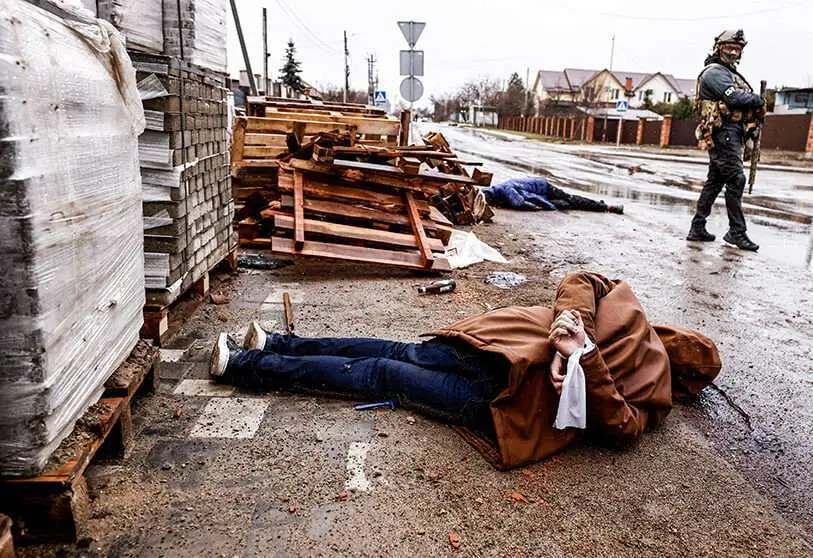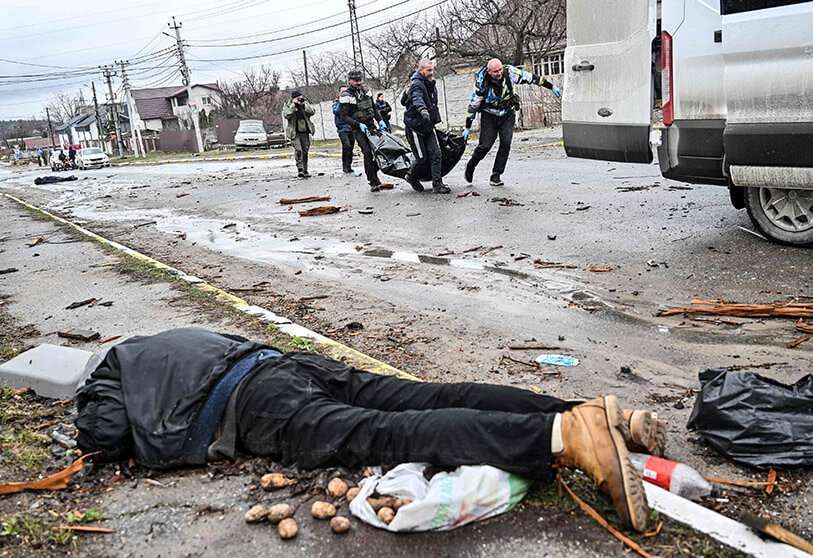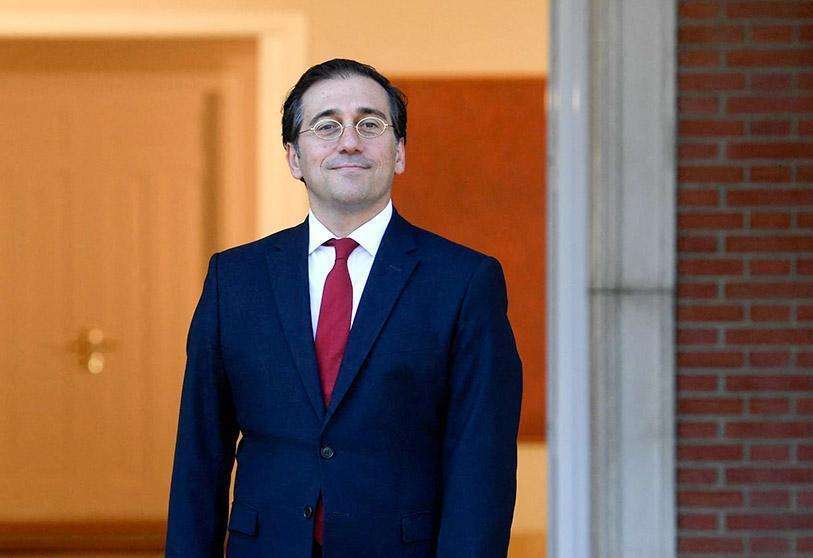The European Union punishes Russia diplomatically and judicially after the Bucha massacre

The European Union reacts to the horror uncovered in the Ukrainian town of Bucha with declarations and expulsions of Russian diplomats. European leaders from different institutions made statements earlier this week to unitedly condemn the massacre of civilians at the hands of Russian troops in the Kiev metropolitan area.
The withdrawal of Russian troops in early April in the Kiev oblast, the result of talks between the Ukrainian and Russian governments in Istanbul, gave way to the advance of Ukrainian forces in the towns of Bucha and Irpin. As the Ukrainians passed through, accompanied by the media, the horrors left by the Russian army's passage were revealed. So far, 400 civilian deaths are estimated in the streets of Bucha and Irpin, while more mass graves or bodies hidden in cellars are being discovered.
The European Union has responded through various leaders, including Josep Borrell, the EU's High Representative for Foreign Affairs, who condemned "in the strongest terms the reported atrocities committed by the Russian armed forces in a number of occupied Ukrainian towns [...] we fully support the investigation launched by the ICC prosecutor into war crimes and crimes against humanity, as well as the work of the OHCHR commission of enquiry", Borrell added in his statement, referring to the ICC investigation into war crimes in Ukraine.

Commission President Ursula Von Der Leyen had a midday telephone conversation with Zelenski to also discuss the "abominable deaths discovered in Bucha". The Commission has announced the launch of a special investigation team that will work with the Ukrainian authorities to gather legal evidence that can be used in the international justice process against Russia. Von der Leyen said that Didier Reynders, the European Commissioner for Justice, will be in charge of drawing up the roadmap with the Ukrainian Prosecutor General.
Didier Reynders, former Defence Minister and Deputy Prime Minister of Belgium, has accepted the task, and briefly detailed the next steps in a thread on his Twitter account.
At a press conference, EU foreign affairs spokesman Peter Stano summarised the EU-27 position and reaffirmed von der Leyen's and Borrell's statements.
Yet again, the Kremlin is showing its true face – murdering civilians in a number of Ukrainian towns such as Bucha.
— European Commission ?? (@EU_Commission) April 4, 2022
We support the investigation by @IntlCrimCourt prosecutor and will advance as a matter of urgency the work on further sanctions against the Kremlin’s war machinery pic.twitter.com/25dqnytGqI
Both Borrell and von der Leyen will travel to Kiev in the coming days, as announced Tuesday by the European Commission's chief spokesman, Eric Mamer. The trip is scheduled for later this week and is aimed at meeting with Zelenski and seeing for themselves the situation in the city. Presidents and prime ministers of the so-called Visegrad group of countries have already travelled to the Ukrainian capital in March, but Borrell and von der Leyen's visit is the highest-level European visit.
Some EU member states have already taken action following the uncovering of the horrors of Bucha. The first were France and Germany, whose Foreign Ministers, Le Drian and Baerbock, announced respectively the expulsion of 30 and 40 diplomats and staff from Russian embassies in their countries.
"France decided this afternoon to expel numerous Russian personnel with diplomatic status stationed in France whose activities are contrary to our security interests.
This action is part of a European approach," reads the Quay d'Orsay communiqué. Sources quoted by the AFP news agency later put the total number of expellees at 30 in the French case.

At midday on Tuesday 5, the French Foreign Ministry summoned the Russian ambassador to Paris, Alexey Meshkov. An hour later, it was announced that the Paris anti-terrorist prosecutor's office was opening an investigation into allegations of war crimes in Ukraine.
Still in France, the French Secretary of State for European Affairs, Clément Beaune, announced on Tuesday morning in an interview on Radio France Internationale that the European Union plans to activate a new package of sanctions against Russia on Tuesday 6 April. Clément Beaune mentioned that the sanctions would affect Russian imports and foreign trade, and says he wants an "embargo on Russian oil and coal", while he is more cautious on the gas issue. "Something that needs to be addressed in the longer term", as reported by EFE.

Spain joined the wave of expulsions at the end of Tuesday morning. Foreign Minister José Manuel Albares, together with the government spokeswoman, confirmed the rumours that the national press had been spreading since the previous day. According to the foreign minister, in the next few hours the order to expel around 25 diplomats and workers from the Russian embassy in Madrid will become effective. "Russia is giving a symmetrical response, as is customary in diplomacy. What is not symmetrical are the reasons why diplomats are expelled. There is no symmetry there", Albares added at the press conference.
Russia has denied the European and Ukrainian version of events, accusing them of staging a false set-up. Despite this, satellite images unveiled by the New York Times reveal the appearance of corpses and graves in the streets of Bucha. The images from the company Maxar Technologies are dated 11 March and already show corpses lying in the city.








